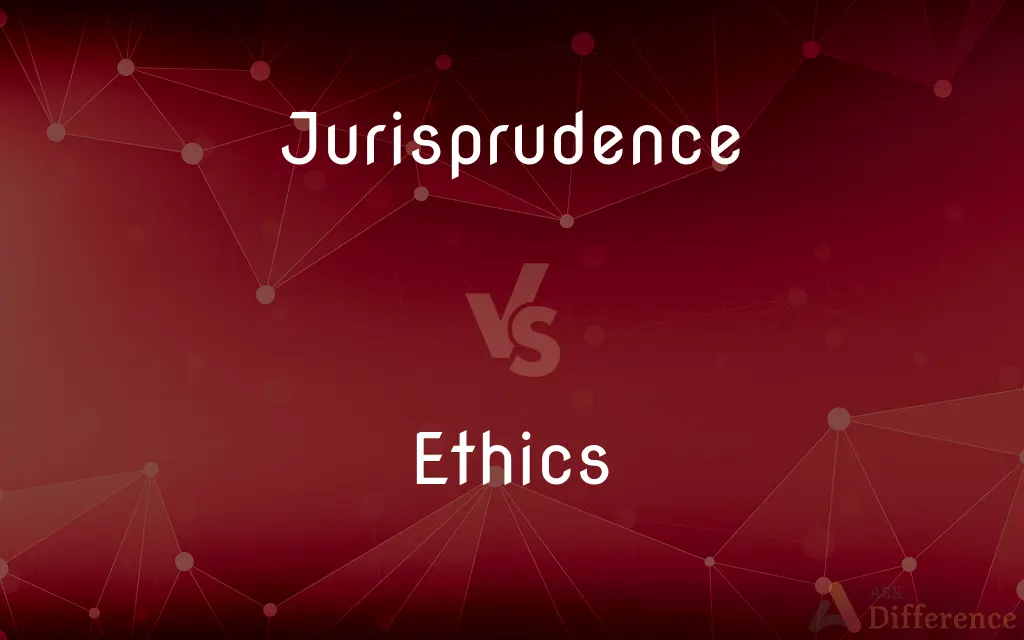Jurisprudence vs. Ethics — What's the Difference?

Difference Between Jurisprudence and Ethics
ADVERTISEMENT
Compare with Definitions
Jurisprudence
Jurisprudence, or legal theory, is the theoretical study of law. Scholars of jurisprudence seek to explain the nature of law in its most general form and provide a deeper understanding of legal reasoning and analogy, legal systems, legal institutions, and the role of law in society.Modern jurisprudence began in the 18th century and was focused on the first principles of natural law, civil law, and the law of nations.
Ethics
Ethics or moral philosophy is a branch of philosophy that "involves systematizing, defending, and recommending concepts of right and wrong behavior". The field of ethics, along with aesthetics, concerns matters of value; these fields comprise the branch of philosophy called axiology.Ethics seeks to resolve questions of human morality by defining concepts such as good and evil, right and wrong, virtue and vice, justice and crime.
Jurisprudence
The philosophy or science of law.
Ethics
Moral principles that govern a person's behaviour or the conducting of an activity
A code of ethics
Medical ethics also enter into the question
Jurisprudence
A division, type, or particular body of law
Modern jurisprudence.
Federal jurisprudence.
Bankruptcy jurisprudence.
ADVERTISEMENT
Ethics
The branch of knowledge that deals with moral principles
Neither metaphysics nor ethics is the home of religion
Jurisprudence
(legal) The theoretical study of law.
Ethics
A set of principles of right conduct.
Jurisprudence
(legal) Case law, or the body of case law regarding a certain subject.
Ethics
A theory or a system of moral values
"An ethic of service is at war with a craving for gain" (Gregg Easterbrook).
Jurisprudence
The science of juridical law; the knowledge of the laws, customs, and rights of men in a state or community, necessary for the due administration of justice.
The talents of Abelard were not confined to theology, jurisprudence, philosophy.
Ethics
Ethics (used with a sing. verb) The study of the general nature of morals and of the specific moral choices to be made by a person; moral philosophy.
Jurisprudence
The branch of philosophy concerned with the law and the principles that lead courts to make the decisions they do
Ethics
Ethics (used with a sing. or pl. verb) The rules or standards governing the conduct of a person or the members of a profession
Medical ethics.
Jurisprudence
The collection of rules imposed by authority;
Civilization presupposes respect for the law
The great problem for jurisprudence to allow freedom while enforcing order
Ethics
(philosophy) The study of principles relating to right and wrong conduct.
Ethics
Morality.
Ethics
The standards that govern the conduct of a person, especially a member of a profession.
Ethics
The science of human duty; the body of rules of duty drawn from this science; a particular system of principles and rules concerting duty, whether true or false; rules of practice in respect to a single class of human actions; as, political or social ethics; medical ethics.
The completeness and consistency of its morality is the peculiar praise of the ethics which the Bible has taught.
Ethics
Motivation based on ideas of right and wrong
Ethics
The philosophical study of moral values and rules
Share Your Discovery

Previous Comparison
Flavoring vs. Flavouring
Next Comparison
Compensate vs. Makeup













































